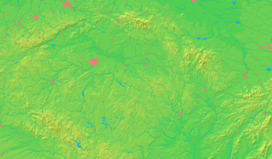Železný Brod
| Železný Brod | |||
| Town | |||
|
|||
| Name origin: iron ford | |||
| Country | Czech Republic | ||
|---|---|---|---|
| Region | Liberec | ||
| District | Jablonec nad Nisou | ||
| Commune | Železný Brod | ||
| River | Jizera | ||
| Elevation | 305 m (1,001 ft) | ||
| Coordinates | CZ 50°38′30″N 15°15′24″E / 50.64167°N 15.25667°ECoordinates: CZ 50°38′30″N 15°15′24″E / 50.64167°N 15.25667°E | ||
| Area | 22.51 km2 (8.69 sq mi) | ||
| Population | 6,492 (2006-12-31) | ||
| Density | 288/km2 (746/sq mi) | ||
| First mentioned | 1346 | ||
| Mayor | František Lufinka | ||
| Timezone | CET (UTC+1) | ||
| - summer (DST) | CEST (UTC+2) | ||
| Postal code | 468 22 - 468 34 | ||
  Location in the Czech Republic | |||
| Wikimedia Commons: Železný Brod | |||
| Statistics: statnisprava.cz | |||
| Website: www | |||
Železný Brod (Czech pronunciation: [ˈʒɛlɛzniː ˈbrot]; German: Eisenbrod) is a town in Liberec Region of the Czech Republic. Located in Jablonec nad Nisou District on the Jizera River, the town is on a railway line connecting Pardubice and Liberec.
History
Železný Brod is an old glass-producing town founded in the eleventh century. It was originally known as Brod ("ford") or Brodek ("little ford"). Železný ("iron") was added to its name in the fourteenth century, alluding to the town's steelworks. In 1501, the town received its coat of arms, representing the law restoration in the town that was carried out by the King Vladislav II of Bohemia. In 1880, the town had 2,698 inhabitants and was the seat of the district court. Its cotton spinning mill was using 50,000 spindles.
The town's main industry is represented by jewellers, as well as producers of blow-moulded glass, thermometers, and small glass commodities.
Demographics
| Year | 1970 | 1980 | 1991 | 2001 | 2003 |
| Inhabitants | 5,663 | 7,099 | 6,826 | 6,544 | 6,442 |
Culture
Town Hall
The Town Hall of Železný Brod was built in 1890 replacing the earlier wooden hall. The Town Theatre (located in the first floor) and the Town Gallery of Vlastimil Rada (located on the ground floor) are both located within the town hall building. The town’s coat-of-arms is displayed on the ground floor.
Běliště
Běliště is the location of the ethnographic exposition of the Town Museum, focusing on the history of Železný Brod and its close surroundings. The building is a one-storey partly timbered house that served as a tannery and a dye-house since 1807. The exposition presents archaeological discoveries, photocopy of records, half-precious stones from Kozákov, iron, slate, limestone, fossils and residue of sea, sculpture of sandstone, artwork by Josef Scheybal, old classes and school's aids, gingerbread products and old baker's bread, flax processing tools, weaving room, textiles, printer's forms, some old clothing, wooden Bethlehems, old ski and sleds, models of citizen’s houses.
Town museum
The museum is located in May 3 Square in the former citizens timber house built in 1792 (since 1936, it served as a part of the savings bank building). It holds the exposition of the Železný Brod glass-making: glass-making room from the last century, personages of the local secondary glass school, businessmen and exporters of the 20th and 40th years of the 20th century, unique glass Bethlehem.
Trávníky
The old Trávníky district is situated behind the brooks Žernovník and is remarkable for the empire houses Grosovsko and Knopovsko, timbered houses in Zahradnická, Hluboká and Fr. Balatky lanes, and St. James Church with wooden belfry.
External links
| Wikimedia Commons has media related to Železný Brod. |

